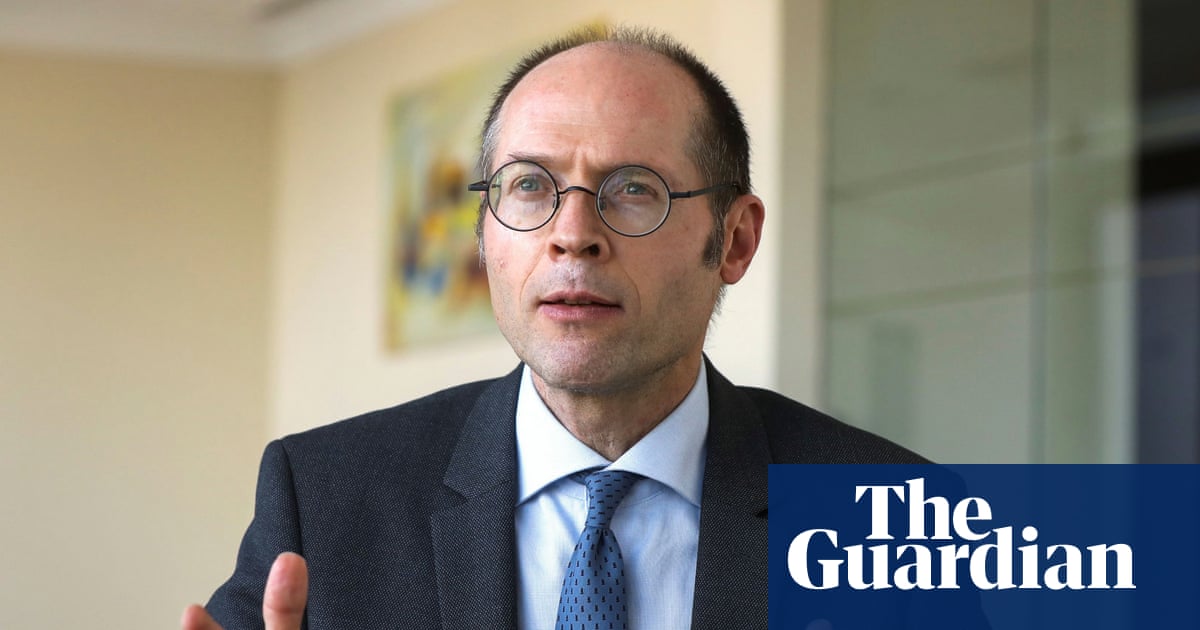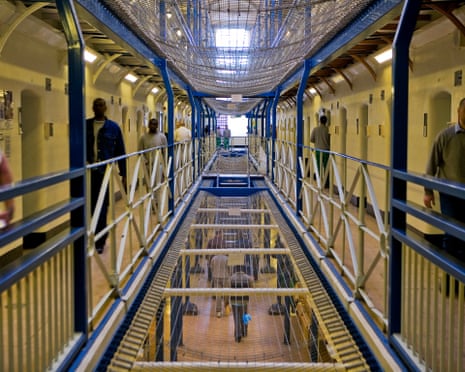
A view inside Wandsworth prison. A manhunt has been launched for two prisoners who were released by mistake. Photograph: Andrew Aitchison/Corbis/Getty Images
Show key events only Please turn on JavaScript to use this feature
Live feed
Prison Governors Association criticises Tories for exploiting release errors, saying long-term underfunding to blame
The Prison Governors Association has just issued a lengthy statement about prisoners being released in error. Without discussing particular cases, it argues that these mistakes are happening because the system is in crisis and underfunded.
Here are the main points.
-
The PGA says releases in error (RiEs, in prison jargon) have happened under every government and “most practitioners, informed commentators, and impartial experts recognise this”.
-
It says RiEs happen because the case management system is “complex and under-resourced”.
-
It says “unprecedented” pressures have made the problem worse. The system is “running hot, and under constant strain”, it says.
The prison system, like the wider criminal justice system, is under unprecedented and sustained pressure. This is not pressure felt in isolation — prisons are interconnected. While some establishments may be coping better than others, the strain is systemic. Decisions made to stabilise one prison — such as reducing capacity or increasing staffing — often have unintended, negative consequences elsewhere. Today, it feels as though every move to ease pressure in one part of the system simply shifts the burden to another …
Despite a recent reduction in the overall prison population, overcrowding remains acute. Around 10,000 people are still held in overcrowded conditions. Crucially, the available space is not in reception prisons like Chelmsford or Wandsworth, which are among the most overcrowded and experience the highest levels of prisoner movement. According to the Howard League for Penal Reform, HMP Wandsworth is operating at 167% of its safe capacity, Chelmsford is at 133% of its safe capacity.
-
It says the rise in the number of RiEs is “deeply concerning”.
The scale of releases in error (RiEs) is deeply concerning. In the last full reporting year, 262 prisoners were released in error, averaging around 65 incidents per quarter. These errors include individuals released either too early or too late from their sentence, both scenarios carry serious consequences and undermine public confidence.
RiE numbers have increased sharply in the past year.
-
But only around 0.5% of prisoners are released on the wrong date, the PGA says. It says, while this figure sounds small, it amounts to “a significant operational failure”. But “the conditions required to reduce this figure to zero simply do not exist”, it says.
-
It says stopping all errors would require “substantial investment in staff training, modern IT infrastructure, and recruitment, all within a system already stretched by competing priorities”.
-
It suggests the Conservatives are being “disingenuous” in trying to exploit this issue politically.
Successive governments have accepted this level of risk for decades. In that context, it feels disingenuous to see politicians attempt to extract political gain from a prison system in crisis …
While political parties showboat and grandstand, the real risk to the public is not being effectively managed — despite the relentless efforts of those working within HMPPS.
This is clearly a reference to the Tories.
-
The PGA says austerity left many prisons “without the flexibility they need to respond to local challenges”.
Key events Show key events only Please turn on JavaScript to use this feature
Referrals to Prevent up 27% on previous year, reaching record high of 8,778, Home Office figures show
There have been a record number of referrals to the government’s counter-terror programme Prevent in a year since data began in 2015, PA Media reports. PA says:
There were 8,778 referrals of individuals to the anti-extremism scheme in 2024/25 – up 27% from 6,922 in the previous year, according to Home Office data.
The figures come as counter-terrorism officials said earlier this week there has been a significant increase in referrals since the Southport murders at a children’s dance class in July 2024.
Prevent is the government’s anti-extremism scheme that is designed to divert people from terrorism.
Southport attacker Axel Rudakubana was referred to Prevent three times, but his case was closed due to a lack of distinct ideology.
The 3,287 referrals in January-March 2025 is the highest number in a single quarter since data began.
Home Office figures published on Thursday show that referrals in the “no ideology” category made up 4,917 (56%) – the largest proportion of referrals of the 8,769 cases where a type of concern was logged.
Where an ideology was identified, extreme right-wing ideology was the most common concern among referrals – accounting for 21% (1,798) of the total, higher than those related to Islamist extremism (10% or 870).
Of the 8,759 referrals to Prevent where the age of the individual was known, 11 to 15-year-olds accounted for the largest proportion (3,192 or 36%), followed by 16 to 17-year-olds (1,178, or 13%).
There were 345 referrals (4% of the total) for children aged 10 or under.
For the first time, data on mental health and neurodiversity (MHND) has been published for individuals referred to Prevent.
These figures show that just over a third of referrals in the year to March 2025 (2,955 of 8,778, or 34%) had at least one MHND condition recorded.
Autistic Spectrum Disorder (ASD) was the most common condition, which was recorded in 14% (1,226) of all referrals.
Around two-thirds of referrals (5,823 or 66%) had no MHND information listed, either because no concern was identified or the relevant information was not captured.
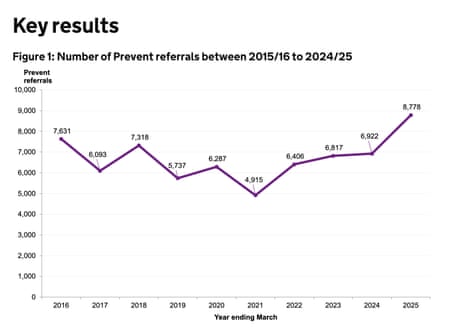
Yesterday I posted reaction from Labour leftwingers, and from Wes Streeting, suggesting the party could learn something from Zohran Mamdani’s victory in New York.
The Labour MP Luke Akehurst has a different view. He posted this on social media this morning, in response to a tweet on this from Clive Lewis.
Can assure Clive I’m one MP who has no desire to be associated with Mamdani at all. The politics that appeals to NYC would go down like a cup of cold sick in US Rust Belt states or in UK equivalents like North Durham.
Large Scottish estates could be broken up under land reform bill passed by Holyrood

Libby Brooks
Libby Brooks is the Guardian’s Scotland correspondent.
Land reform legislation passed by the Holyrood parliament marks a “watershed moment”, according to the Scottish government, after MSPs voted last night to back a series of measures which aim to reduce the concentration of rural land ownership, where small numbers of people own large areas of Scotland’s countryside.
The new law will increase opportunities for community buyouts of land, and also proposes that when large estates are put on the market these could be broken up into smaller areas – in a process known as lotting – if certain conditions are met.
Scottish Land and Estates, which represents landowners, branded the moves “junk law”, warning that parts of the bill were badly drafted (to be fair this is an ongoing criticism of Holyrood bills) and likely to be challenged in the courts.
But the result was welcomed by the Revive Coalition, which campaigns for fairer ownership across Scotland. Max Wiszniewski said:
It’s a stark reminder that roughly the same number of people – just 421 – own more than half of Scotland’s private rural land. This extreme concentration of ownership is why land reform remains so crucial and why the land reform journey must continue.
Prison Governors Association criticises Tories for exploiting release errors, saying long-term underfunding to blame
The Prison Governors Association has just issued a lengthy statement about prisoners being released in error. Without discussing particular cases, it argues that these mistakes are happening because the system is in crisis and underfunded.
Here are the main points.
-
The PGA says releases in error (RiEs, in prison jargon) have happened under every government and “most practitioners, informed commentators, and impartial experts recognise this”.
-
It says RiEs happen because the case management system is “complex and under-resourced”.
-
It says “unprecedented” pressures have made the problem worse. The system is “running hot, and under constant strain”, it says.
The prison system, like the wider criminal justice system, is under unprecedented and sustained pressure. This is not pressure felt in isolation — prisons are interconnected. While some establishments may be coping better than others, the strain is systemic. Decisions made to stabilise one prison — such as reducing capacity or increasing staffing — often have unintended, negative consequences elsewhere. Today, it feels as though every move to ease pressure in one part of the system simply shifts the burden to another …
Despite a recent reduction in the overall prison population, overcrowding remains acute. Around 10,000 people are still held in overcrowded conditions. Crucially, the available space is not in reception prisons like Chelmsford or Wandsworth, which are among the most overcrowded and experience the highest levels of prisoner movement. According to the Howard League for Penal Reform, HMP Wandsworth is operating at 167% of its safe capacity, Chelmsford is at 133% of its safe capacity.
-
It says the rise in the number of RiEs is “deeply concerning”.
The scale of releases in error (RiEs) is deeply concerning. In the last full reporting year, 262 prisoners were released in error, averaging around 65 incidents per quarter. These errors include individuals released either too early or too late from their sentence, both scenarios carry serious consequences and undermine public confidence.
RiE numbers have increased sharply in the past year.
-
But only around 0.5% of prisoners are released on the wrong date, the PGA says. It says, while this figure sounds small, it amounts to “a significant operational failure”. But “the conditions required to reduce this figure to zero simply do not exist”, it says.
-
It says stopping all errors would require “substantial investment in staff training, modern IT infrastructure, and recruitment, all within a system already stretched by competing priorities”.
-
It suggests the Conservatives are being “disingenuous” in trying to exploit this issue politically.
Successive governments have accepted this level of risk for decades. In that context, it feels disingenuous to see politicians attempt to extract political gain from a prison system in crisis …
While political parties showboat and grandstand, the real risk to the public is not being effectively managed — despite the relentless efforts of those working within HMPPS.
This is clearly a reference to the Tories.
-
The PGA says austerity left many prisons “without the flexibility they need to respond to local challenges”.
Any manifesto-busting tax rises in budget should be 'temporary and conditional', Tony Blair's thinktank says
Rachel Reeves should make it clear that any big tax rises in the budget will only be temporary, Tony Blair’s thinktank has said.
The Tony Blair Institute has published a paper saying that the budget measures should focus on delivering growth, and it says, if Reeves does break Labour manifesto promise not to raise any of the three main taxes, she should say this won’t be permanent.
In a speech on Tuesday, Reeves came close to confirming that income tax will go up.
In its report, the TBI says:
Tax rises are … widely expected at the budget, with early indicators pointing to a collection of smaller measures to plug the gap. Yet bond markets are signalling that something more decisive may be needed to restore confidence and avoid another round of fiscal firefighting next year.
If the chancellor opts for a larger revenue-raising step – particularly a manifesto-breaching increase in income tax or value-added tax (VAT) – she should make clear that it is temporary and conditional: a short-term measure to stabilise the public finances, not a permanent shift in direction.
The message should be that today’s discipline creates tomorrow’s dividend; once growth strengthens and public-service reforms deliver results, the gains should be returned to taxpayers through targeted tax cuts before the election.
As prime minister, Blair tried hard to stop Labour being seen as a high-tax party. But in 2002 he allowed Gordon Brown, the chancellor, to raise national insurance by 1p in the pound. Brown had spent months trying to persuade the public that the NHS needed more funding, and the NI rise was explained as being need to raise money for health, and – to the surprise of some in politics – the move turned out to be popular with voters.
Rachel Reeves ‘planning pay-per-mile tax for electric vehicles in budget’
Rachel Reeves is drawing up plans for a new pay-per-mile tax for electric vehicles to announce in this month’s budget worth an extra £250 a year on average, Julia Kollewe reports.
David Lammy set to face media as Tories accuse him of ‘dereliction of duty’ over prisoners released by mistake
Good morning. Except it isn’t if you are David Lammy, the deputy PM and justice secretary. Or Alex Davies-Jones, a junior justice minister, who has been doing the morning media round. Lammy took PMQs for the first time yesterday, but the coverage is a nightmare, partly because it coincided with news about two more prisoners being released by mistake, even though Lammy recently required governors to do extra checks to stop this happening, and partly because he dodged questions about this in the chamber.
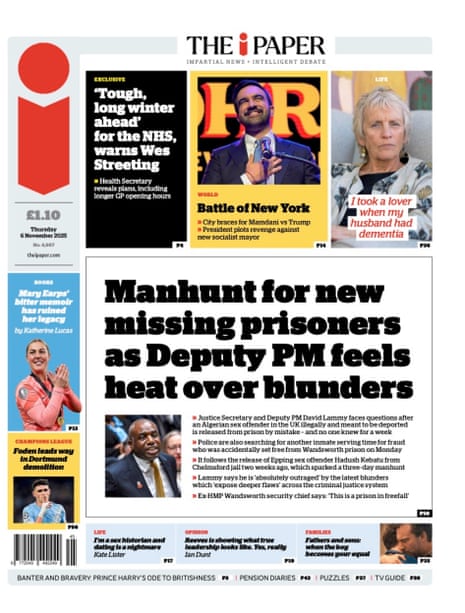
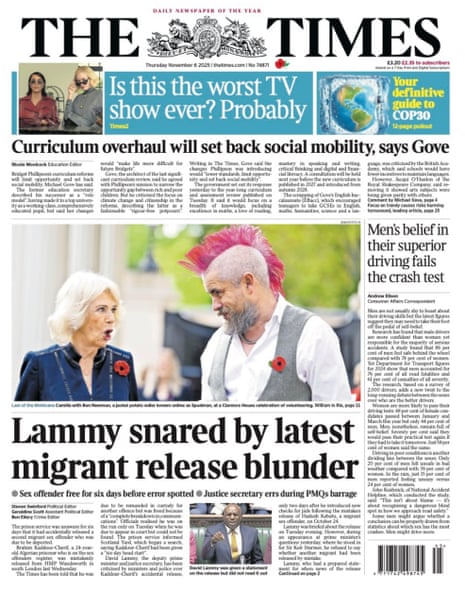


The overnight Guardian version of the story is here.
For the Conservatives, this is like Christmas has come early (even though their spokesperson, James Cartlidge, who was deputisting for Kemi Badenoch at PMQs, messed up his questions, as John Crace explains here). Crudely put, their assumption is: people don’t like criminals, people don’t like migrants, so migrant criminals are doubly bad, and Labour are letting them out. As they have been commenting on this over the past 24 hours, Kemi Badenoch, Chris Philp, Robert Jenrick et al have found it hard to conceal the glee.
As ever, the reality is a bit more complicated. Of all public services, the prison service is probably the most dysfunctional, and has been for years. The accidental release of prisoners, though deplorable, is not that unusual; Lammy told the Commons recently that under Tories they were happening at a rate of 17 per month. Under Labour, the numbers have gone up sharply, but that has coincided with the government implementing a huge early release scheme because, when it came into office, the prison service was days away from not being able to take any more inmates because of over-crowding. The Algerian released by mistake from Wandsworth prison last week was not an asylum seeker, as the Tories originally claimed. He is a sex offender – on the basis of an indecent exposure conviction, for which he got an 18-month community order. He reportedly has other convictions too. A few days after he was mistakenly released, a white man from Surrey who had been jailed for almost four years for fraud offences was also let out by mistake, but the Tories don’t seem so interested in that error.
Here is a round-up of the latest developments on this story this morning.
-
Prison governors in England have been summoned to an urgent meeting with ministers to discuss release errors, Davies-Jones has revealed. Here is our story, by Eleni Courea.
-
The Ministry of Justice has said that Lammy did not tell MPs about the accidental release of the Algerian offender in the Commons yesterday because he did not have full information about it. In a statement released last night, an MoJ spokersperson said:
The crisis in the prison system this government inherited is such that basic information about individual cases can take unacceptably long to reach ministers.
On entering the house, facts were still emerging about the case and the DPM had not been accurately informed of key details including the offender’s immigration status. No media story about the individual case was yet in the public domain and it was and remains subject to a live police investigation.
The DPM was asked questions about the release of an asylum seeker. As was confirmed after PMQs by the Home Office, the individual was not an asylum seeker.
The DPM waited until after PMQs and further facts had emerged before making a statement.
-
Robert Jenrick, the shadow justice secretary, has accused Lammy of a “total dereliction of duty” over this affair. Referring to the accidental release of the Algerian, Jenrick told the Today programme:
It took six days for the prison service supposedly to even become aware that this had happened and inform the Metropolitan police, who are now a week behind in the manhunt to find him.
Then the justice secretary is informed about this on Tuesday night, didn’t come clean.
He spent the next morning, we’re told, going out shopping for a suit, rather than taking charge of his department.
He then comes to parliament and doesn’t answer five straight questions about this. I think it’s a disgrace. It’s a total dereliction of duty.
-
Lammy will be speaking to the media later today, Davies-Jones has said. In her Today interview, she said that Lammy was visiting a prison this morning, “doing his day job”, and that he would be “speaking to the media”. When it was put to her that Lammy should be answering questions, she said he would be.
Here is the agenda for day.
Morning: Gordon Brown, the former prime minister, gives a speech on child poverty at Somerset House.
Morning: David Lammy is due to speak to the media during a prison visit.
Noon: The Bank of England releases its latest interest rates decision. Graeme Wearden is covering this on his business live blog.
Lunchtime: Kemi Badenoch is on a visit in Staffordshire.
And Keir Starmer is in Brazil for the Cop30 summit.
The Commons is not sitting because there is a mini recess.
If you want to contact me, please post a message below the line when comments are open (normally between 10am and 3pm BST at the moment), or message me on social media. I can’t read all the messages BTL, but if you put “Andrew” in a message aimed at me, I am more likely to see it because I search for posts containing that word.
If you want to flag something up urgently, it is best to use social media. You can reach me on Bluesky at @andrewsparrowgdn.bsky.social. The Guardian has given up posting from its official accounts on X, but individual Guardian journalists are there, I still have my account, and if you message me there at @AndrewSparrow, I will see it and respond if necessary.
I find it very helpful when readers point out mistakes, even minor typos. No error is too small to correct. And I find your questions very interesting too. I can’t promise to reply to them all, but I will try to reply to as many as I can, either BTL or sometimes in the blog.
Explore more on these topics

 3 months ago
122
3 months ago
122

